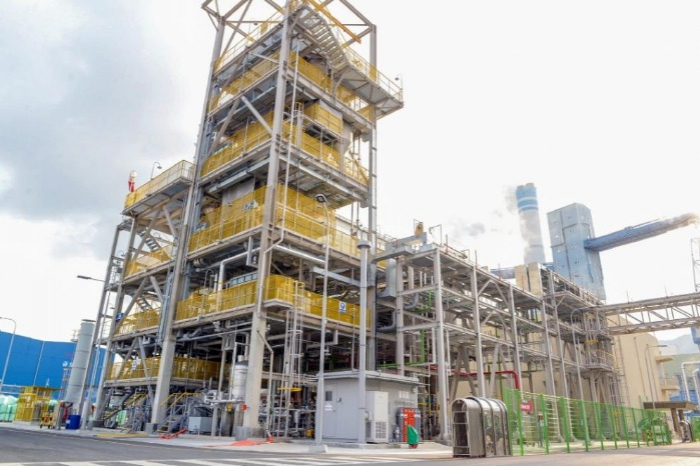Chemical Industry
LG Chem to build carbon nanotube Plant 4 for EV batteries
It is poised to be the world's largest single-line carbon nanotube manufacturing center with an annual 6,100-ton production capacity
By Aug 30, 2022 (Gmt+09:00)
2
Min read
Most Read
LG Chem to sell water filter business to Glenwood PE for $692 million


Kyobo Life poised to buy Japan’s SBI Group-owned savings bank


KT&G eyes overseas M&A after rejecting activist fund's offer


StockX in merger talks with Naver’s online reseller Kream


Mirae Asset to be named Korea Post’s core real estate fund operator



LG Chem Ltd., South Korea’s chemicals giant, is set to build the world’s largest single-line carbon nanotube (CNT) manufacturing plant in Korea to bolster its competitiveness in the global electric vehicle industry.
The new plant will be the chemical maker’s fourth CNT manufacturing factory, producing up to 3,200 tons of CNT yearly, LG Chem said on Aug. 30.
CNT is a next-generation material offering an equivalent level of electricity and thermal conductivity to copper and diamond and with 100 times the strength of steel. The material has a wide range of applications in EV batteries, conductive coatings, automobile electrostatic paint and surface heating elements.
Plant 4 will raise LG Chem’s annual CNT production capacity to 6,100 tons, the largest in Korea.
The plant will be based in Daesan, 80 kilometers southwest of Seoul, with construction starting in the first half of 2023 and commercial operations commencing in the second half of 2024.
The combined annual CNT production capacity of Plant 1 and 2 is 1,700 tons, and Plant 3, which is under construction to increase its facilities, produces up to 1,200 tons a year.
LG Chem started operations of Plant 1 in 2017 with 500 tons of CNT production and has expanded the manufacturing facilities every year since 2020.
The fourth plant will also have 20% higher productivity per capita than the other plants by enhancing efficiency in process automation, the firm said.
The chemicals maker’s plants produce high-quality batteries by using cobalt-based catalysts, which lower magnetic impurities, LG Chem said. Ferrum-based catalysts, which are more commonly used in CNT production, have more magnetic impurities than cobalt-based ones and need separate post-treatment, the chemical firm added.
LG Chem will supply its CNT as a conductive additive to LG Energy Solution Ltd. and other battery makers.
As conductive additives, CNT shows 10% more conductivity than carbon black. This allows battery makers to use 30% fewer conductive additives, fill the batteries with more cathodes and extend their lifespan and capacity.
The global CNT conductive additive market is expected to grow to $2.3 billion by 2030, in line with increasing demand for the material from 5,000 tons in 2021 to 70,000 tons by 2030, LG Chem said.
Write to Kyung-Min Kang at kkm1026@hankyung.com
Jihyun Kim edited this article.
More to Read
-
 PetrochemicalsLG Chem, ADM to build two bioplastics plants in Illinois
PetrochemicalsLG Chem, ADM to build two bioplastics plants in IllinoisAug 16, 2022 (Gmt+09:00)
2 Min read -
 BatteriesLG Chem, GM in $30.6 billion EV battery materials supply deal
BatteriesLG Chem, GM in $30.6 billion EV battery materials supply dealJul 28, 2022 (Gmt+09:00)
2 Min read -
 BatteriesLG Chem, Korea Zinc affiliate KEMCO to launch battery precursor JV
BatteriesLG Chem, Korea Zinc affiliate KEMCO to launch battery precursor JVJun 02, 2022 (Gmt+09:00)
1 Min read -
 BatteriesLG Chem to launch JV with China's Huayou Cobalt for battery materials
BatteriesLG Chem to launch JV with China's Huayou Cobalt for battery materialsJun 01, 2022 (Gmt+09:00)
1 Min read -
 Bio & PharmaLG Chem receives FDA nod for CUE-102 cancer treatment phase 1 trials
Bio & PharmaLG Chem receives FDA nod for CUE-102 cancer treatment phase 1 trialsMay 13, 2022 (Gmt+09:00)
1 Min read
Comment 0
LOG IN


